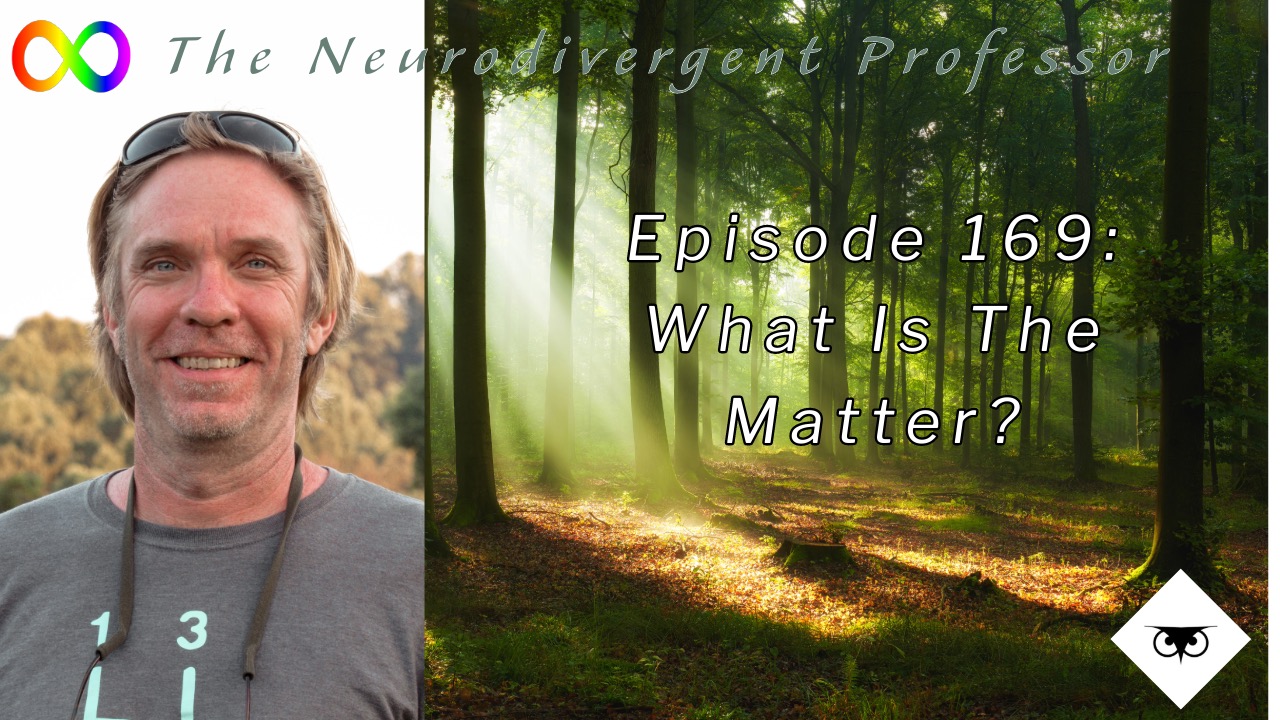Ranking importance is critical to mental health

What IS the matter?
Matter is an interesting word. It’s a noun and a verb. The noun means something of substance and can be physical or metaphysical. The verb means for something to be important. There’s matter, and there is the matter. I like words like that, but the complication of communication and understanding.
The idea of something mattering, as a verb, has been on my mind lately. The last two episodes (here and here) have focused on the relationship between our experiences and our stress. What matters directly affects our bodies, our minds, and our well-being.
Everything can’t matter
Many of us don’t discriminate among the barrage of experiences we face. Our inability to rank things in our lives means that everything matters. If everything matters, we’re exhausted. We can’t pay attention to all the things.
And why would we? So many things don’t matter. So much of our lives are inconsequential. I would go so far as to say MOST of the things we worry about don’t ever amount to anything.
It’s like the quote attributed to Mark Twain,
I’ve lived through some terrible things in my life, some of which actually happened.
How many of us are plagued by near-constant worry? Wouldn’t it be great if we could care less about some things?
Awareness, inventory, and ranking are required
The first step is self-aware. Truly, I think this is the ultimate cause of human suffering. Lack of self-awareness leads us to two ways of being. Either we are completely unaware and hedonistic, or we are hyper-aware and overcome with worry.
In either case, self-awareness can make us better people. Better in the sense that empathy for our fellow humans is a necessary part of being interconnected. And also that hypervigilance and constant worry is a fate I wouldn’t wish on my worst enemy. Ask me how I know.
I talk a lot about self-awareness and I don’t know how to create it where it doesn’t exist. I do know that things like journaling, meditation, mindfulness, and healthy living help nurture a state of awareness.
Once we are aware, we can inventory the things that we experience in our lives. We wake up. Have coffee. Maybe we give care to the family. Maybe we go to work. We drive a car. All of the things we do have the potential to matter — but not all of them!
An inventory of our life things and experiences, the physical and metaphysical, facilitates ranking and prioritizing. This process is similar to and often benefits from following a personal values assessment. We identify what matters, and then rank these things are high or low.
High-ranking values demand our attention and energy. The low-ranking stuff? Not so much. This immediately frees up a lot of worry, reduces stress, and helps us maximize the things that DO matter.
Our minds dream up the story
No one can tell you what matters. Though I do believe there are universal values that are critical to all forms of life, our inventories will differ. The important part — the part that matters — is the process of figuring this out for ourselves. It is dynamic and requires frequent reassessment.
This process of continually identifying what matters is our dream of life. This is the story we tell ourselves and others. To some degree, we have control over this story and we get to choose whether it is a horror film or a fairy tale. Some things we cannot change and our privilege, or lack thereof, certainly comes into play.
Jon Kabat-Zinn considers our mind a sixth sense and I am starting to agree. What matters to us comes through our five senses but is interpreted in our minds. Our minds interpret by creating a story or a dream of our life. This becomes our reality. What matters is largely subjective, but certainly, there is some objectivity. Aren’t there some values that are inherent or universal to being alive?
Can nature advise us?
Can we let evolution provide a lens to consider what matters? In nature, the things that matter are selected for while the less important stuff tends to go away. Traits or conditions that benefit a species start showing up with greater frequency whereas less beneficial features might decrease.
I like to assign evolutionary ‘value’ to human preferences. My favorite example is competition versus cooperation. We can find elements of both in the world. But which is showing up with greater frequency in successive generations? Which model makes the most sense in emerging populations? Which strategy might have the greatest long-term benefit?
This approach helps me understand myself in the context of our ancestors and present conspecies. What matters is what persists.
Our human minds have evolved more quickly than our prowess. I believe we are only now beginning to understand the relationship between our awareness and the dream that becomes our reality. We have an opportunity to cooperate and to tell stories with happy endings.
So, what matters to you? What matters to all of us?
Podcast audio:
https://www.buzzsprout.com/530563/14719618
YouTube video:
Discover more from Revolutionizing human evolution
Subscribe to get the latest posts sent to your email.

